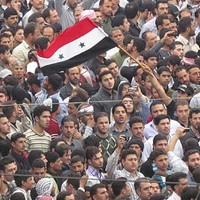AL BAB, Syria -- There is clearly something improvised about the courtroom scene: The prison guard wears civilian clothes and holds an assault rifle. He and a prisoner pose with a wide grin for a visiting photographer. The court sits in a simple office room, in a building whose courtyard has been partially damaged by bombardment.
Yet this is very much government in action. With a 48-member council, a “council manager” (elected for a one-month term by council vote) and a criminal court, civic government is reasserting itself in this northern Syrian city of about 180,000 people after rebel fighters pushed government forces out at the end of July. Al Bab is far from peaceful: Government jets bombard it almost every day, and up to two-thirds of the population has fled. But a measure of normalcy has been re-established.
In the makeshift court, the 12 judges gravely seat themselves to hear the case before them, a financial dispute between a man and his son that degenerated into a fistfight. The court applies a mixture of civil and Islamic (Shariah) law. Two of the judges are civil lawyers, while 10 are religious scholars, two of them professors at Aleppo University.

